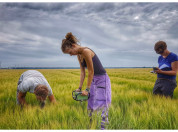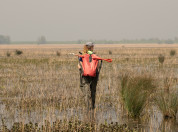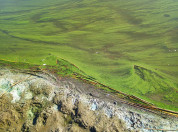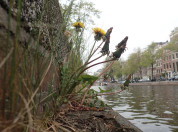News
Search results
-
Less intensive works best for agricultural soil
The less intensively you manage the soil, the better the soil can function. Such as not ploughing as often or using more grass-clover mixtures as cover crops. These are the conclusions from a research team led by the Netherlands Institute of Ecology (NIOO-KNAW). Surprisingly, it applies to both conventional and organic farming. These important insights for making agriculture more sustainable are published in the scientific journal Science today. ‘It offers clear evidence to help farmers manage soils better.’
-
Up and down the marshes
Lower the water level in a marsh temporarily and you get a more resilient, healthy and biodiverse ecosystem in return. That is the advice of ecologist Kerstin Bouma and her colleagues at the Netherlands Institute of Ecology (NIOO-KNAW). An extraordinary opportunity presented itself in the Oostvaardersplassen to find out how this works. She defended her PhD on that research in the mud and among the reeds on Friday 4 April.
-
Ancient blue-green algae bloom more and more
Every summer there they are again, blue-green algae. Why are they a problem, are they getting worse with climate change and what can we do about them? These are questions that the Netherlands Institute of Ecology (NIOO-KNAW) has over the past few years been and still is seeking answers to. The research has provided new insights into fundamental processes, from the cellular level to large-scale changes in lakes and ponds. This allows better assessment of risks and possible development of new control methods.
-
Taking notice of water in nature
This is the third article in a series on 70 years of ecological research at the Netherlands Institute of Ecology (NIOO-KNAW), this time on water research. -
Stefan Dekker named new director of the Netherlands Institute of Ecology
Ecohydrologist Stefan Dekker has been named the new director of the Netherlands Institute of Ecology (NIOO-KNAW), the Royal Netherlands Academy of Arts and Sciences' national institute for ecological research, effective 15 June 2025. Dekker is currently serving as professor of Global Ecohydrology and Sustainability at Utrecht University and as research director of the Copernicus Institute of Sustainable Development. He will succeed NIOO’s interim director Wim van der Putten.
-
"I started with a short-term project and never left"
On 1 October, Wim van der Putten took over the directorship from predecessor Geert de Snoo. For the Netherlands Institute of Ecology (NIOO-KNAW) he is a familiar face. Van der Putten started at the 'IOO' back in 1984. He shares stories about his career so far, and his work as interim director.
-
Five years as a director: a retrospective and a peek at the future
Until October last year, Geert de Snoo was at the helm of the Netherlands Institute of Ecology (NIOO-KNAW). A few months later, we look back with him on five years of directorship and talk about his new role as director of research policy at the Royal Netherlands Academy of Arts and Sciences (KNAW).
-
Do methane cycling microbes keep Arctic lakes in check?
How do microbes influence the methane release in the arctics? And how will climate change influence these microorganisms? These questions and more are what a new research project led by Suzanne McGowan of the Netherlands Institute of Ecology (NIOO-KNAW) will try to answer.
-
Extreme climate pushed thousands of lakes in West Greenland 'across a tipping point'
West Greenland is home to tens of thousands of blue lakes that provide residents drinking water and sequester carbon from the atmosphere. Yet after two months of record heat and precipitation in fall 2022, an estimated 7,500 lakes turned brown, began emitting carbon and decreased in water quality, according to a new study NIOO is involved in.
-
Dandelion evolves along with hot city
City dandelions grow better in hot summers and flower better after mild winters than their rural counterparts. This is according to research by the Netherlands Institute of Ecology (NIOO-KNAW) that compared dandelions from the centre of Amsterdam with plants outside the city. These experiments - published in the December edition of Evolution Letters - show that dandelions evolved to adapt to urban heat. Such knowledge is essential for sustainable urban planning.
-
New head of Terrestrial Ecology department: Ciska Veen
We are happy to welcome Ciska Veen as the new head of the department of Terrestrial Ecology of the Netherlands Institute of Ecology (NIOO-KNAW). Ciska will start on 1 February 2025.
-
Two new research projects to improve water management
Lakes play a major role in providing ecosystem services. But the ecological status and water quality of these lakes is often still not good enough, and is further threatened by the effects of climate change. Two new projects at the Netherlands Institute of Ecology (NIOO-KNAW) will look for solutions to this problem.
